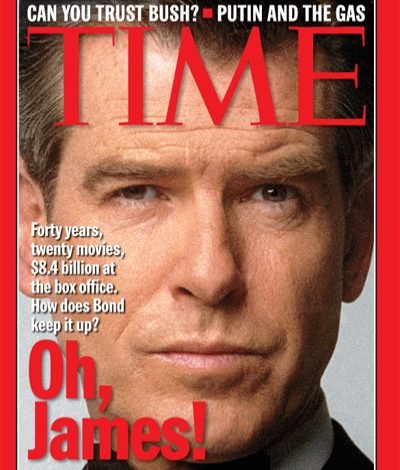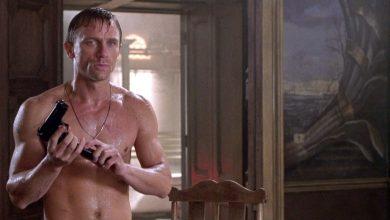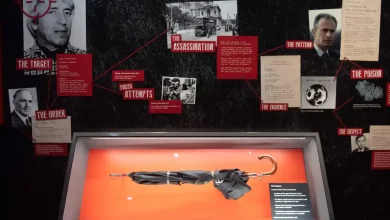Read Every Single TIME Review of the James Bond Movies

James Bond, the iconic British spy, has captivated audiences for over half a century with his thrilling adventures on the silver screen. From the suave charisma of Sean Connery to the rugged intensity of Daniel Craig, the Bond franchise has seen various actors bring their unique interpretations to the role. Throughout its history, the series has received a mixed response from critics, with some films hailed as classics and others facing criticism for their departures from the franchise’s traditional formula.
In this article, we explore TIME’s reviews of all 24 official James Bond movies, providing insights into the publication’s assessments of each film. From the groundbreaking “Casino Royale” to the nostalgic grandeur of “Skyfall,” we delve into the diverse range of opinions expressed by TIME’s critics. Join us as we journey through the highs and lows, the successes and shortcomings, of one of cinema’s most enduring and beloved franchises.
Key Takeaways
- TIME’s reviews of the James Bond movies reflect a diverse range of opinions, with some films receiving critical acclaim while others faced criticism or went unreviewed.
- Certain Bond films, such as “Skyfall” and “Casino Royale,” were praised for their innovative storytelling, memorable performances, and relevance to contemporary issues.
- The franchise has seen different actors bring their own interpretations to the role of Bond, with Sean Connery earning significant praise for his portrayal.
- The Bond formula has at times faced criticism for its perceived lack of originality and reliance on familiar tropes, while still maintaining a dedicated fan base appreciative of its iconic elements.
Dr. No
TIME’s review of “Dr. No” described James Bond as a captivating character who has enticed audiences both in print and on screen. The review highlighted the success of Ian Fleming’s novels, which had sold over 11 million copies worldwide by that time. With Sean Connery’s portrayal, Bond made a promising transition to the big screen.
Read the full review here
From Russia With Love
In their review of “From Russia With Love,” TIME commended the film for its fast-paced, smart, and well-directed execution. While acknowledging that the movie didn’t aim for sophistication, the review emphasized its ability to entertain with cleverness and humor. The film’s success suggested that even dark and gritty subjects could be presented with a touch of levity.
Read the full review here
Goldfinger
TIME’s review of “Goldfinger” recognized the film’s extravagance, acknowledging that it deliberately aimed to be over the top. This Bond adventure delivered an abundance of action, style, and iconic moments that have become synonymous with the franchise. Despite its exaggerated nature, the film managed to captivate audiences and leave a lasting impression.
Read the full review here
Thunderball
While conceding that “From Russia With Love” remained the liveliest Bond film up to that point, TIME hailed “Thunderball” as the most spectacular entry in the series. The review noted the absence of genuine wit in the script but highlighted the film’s appeal to Bond fans who relished the character’s luxurious lifestyle and over-the-top requests. The spectacle and grandeur of “Thunderball” contributed to its success.
Read the full review here
You Only Live Twice
As “You Only Live Twice” hit the screens, TIME observed that James Bond had become a subject of parody and imitation, causing the original character to appear as a copy of his flamboyant imitators. The review acknowledged the cult following surrounding Bond but hinted at the challenges of sustaining originality in the face of numerous imitations.
Read the full review here
On Her Majesty’s Secret Service
TIME did not provide a review for “On Her Majesty’s Secret Service.” However, the review of the book noted that Bond’s ultimate fear was not facing death but the prospect of marriage, adding an intriguing layer to the character’s development.
Diamonds Are Forever
Diamonds Are Forever” marked the return of Sean Connery to the role of James Bond, and TIME acknowledged that the character seemed to grow more resilient with age. Despite the passage of time and the changing cultural landscape, Bond remained as popular as ever, showcasing the enduring appeal of the franchise.
Read the full review here
Live and Let Die
In reviewing “Live and Let Die,” TIME criticized the film for being the most vulgar addition to the Bond series. The review suggested that the franchise had outlived its historical moment and relied on outdated elements, tarnishing its previous sophistication and relevance.
Read the full review here
The Man With the Golden Gun
TIME compared the inclusion of a flying car in “The Man With the Golden Gun” to the film’s shortcomings, highlighting an overreliance on gimmicks and a lack of inspiration. The review characterized the Bond series as stretched thin, with diminishing returns in terms of creativity and wit.
Read the full review here
The Spy Who Loved Me
In their review of “The Spy Who Loved Me,” TIME questioned the connection between the film and the 1962 novel of the same name. The review suggested that little remained of the Bond formula, aside from the presence of 007, attractive leading ladies, and flashy gadgets. It posed the question of whether the series ever consisted of much else.
Read the full review here
Moonraker
TIME acknowledged that Bond films had evolved over the course of 17 years, yet still managed to maintain their appeal. With “Moonraker,” the review highlighted the enduring charm of the impeccably dressed British agent. The film showcased Bond as a symbol of Western civilization’s virtues, even amidst changing cultural and political landscapes.
Read the full review here
For Your Eyes Only
TIME employed a unique analogy to evaluate “For Your Eyes Only” and other Bond movies, likening them to successive models off an assembly line. Each film had its strengths and weaknesses, but all adhered to the series’ standards of speed, style, and emotional control. The review implied that audiences knew what to expect and found comfort in the familiar Bond formula.
Read the full review here
Octopussy
In the review of “Octopussy,” TIME reflected on the evolution of the Bond character. From being a role model of style and sophistication during Sean Connery’s era, Bond had transformed into a genial anachronism embodied by Roger Moore. The review suggested that the franchise had lost some of its substance and devolved into a showcase for superficial charm.
Read the full review here
A View To a Kill
TIME’s review of “A View To a Kill” expressed disappointment, comparing the film to a memory bank depleted of creativity. The review hinted at a decline in quality, suggesting that the film lacked the ingenuity and freshness of earlier Bond installments.
Read the full review here
The Living Daylights
In “The Living Daylights,” Timothy Dalton took on the role of Bond with a touch of Sean Connery’s lethal charm and a hint of Harrison Ford’s ruggedness. The review highlighted the film’s reflection of the changing times, acknowledging the impact of the AIDS epidemic on Bond’s character and relationships. The film showcased Bond’s ability to adapt while remaining true to his nature.
Read the full review here
Licence to Kill
Licence to Kill” offered impressive action sequences and thrilling truck stunts. However, TIME’s review lamented the missed opportunity to provide the human characters with equally clever and engaging storylines. Despite the film’s technical achievements, the review hinted at a lack of intelligent writing.
Read the full review here
Goldeneye
With the arrival of a new Bond actor, Pierce Brosnan, and the post-Cold War era, “Goldeneye” faced the challenge of maintaining the franchise’s established conventions. TIME questioned the durability of these conventions after decades of use and the changing landscape of espionage. The review suggested a slight uncertainty about the franchise’s future.
Read the full review here
Tomorrow Never Dies
Drawing on the success of “Goldeneye,” TIME expressed a Christmas wish for “Tomorrow Never Dies” to replicate its glamorous box office performance. The review hinted at the commercial aspirations of the Bond franchise and its desire to maintain its status as a profitable cultural phenomenon.
Read the full review here
The World Is Not Enough
TIME did not provide a review for “The World Is Not Enough,” leaving the audience without their critical insights on this particular Bond adventure.
Die Another Day
“Dying Another Day” featured Halle Berry, an Oscar-winning actress, emerging from the sea, symbolizing the enduring popularity of Bond. TIME highlighted Ian Fleming’s creation of a character that would evolve into a successful film franchise, even long after the author’s passing. The review emphasized the series’ ability to rejuvenate and recapture the public’s imagination.
Read the full review here
Casino Royale
“Casino Royale” marked a new chapter in the Bond series, portraying an agent on his first significant mission. TIME noted the departure from the suave and sophisticated Bond of legend, with Daniel Craig’s interpretation bringing a rougher and more taciturn edge to the character. Despite the shift in style, the review acknowledged the strength and coldness that defined Bond as Fleming intended.
Read the full review here
Quantum of Solace
TIME described “Quantum of Solace” as a brisk and action-packed Bond film. The review highlighted director Marc Forster’s ability to create a thrilling pace and nonstop suspense. While acknowledging the departure from the lightheartedness of earlier films, the review praised the vigor and energy injected into the franchise.
Read the full review here
Skyfall
With “Skyfall,” TIME commended the film for its ability to stand as a satisfying and self-contained piece of entertainment. The review recognized the film’s nods to the series’ iconic elements, such as the Aston Martin and the classic theme song. “Skyfall” struck a balance between honoring tradition and offering a captivating standalone experience.
Read the full review here
Spectre
TIME regarded “Spectre” as a sophisticated sugar rush, acknowledging its status as the longest Bond film yet. Despite its length, the review praised the film’s elegant sense of danger and intrigue, indicating its successful execution as a thrilling spy adventure.
Read the full review here
FAQ
1. What is the most critically acclaimed James Bond movie?
While critical reception varies for each James Bond movie, one that stands out as highly acclaimed is “Skyfall.” Released in 2012, the film garnered widespread praise for its thrilling storyline, stunning cinematography, and stellar performances. Critics hailed it as a standout entry in the franchise, combining modern sensibilities with a deep appreciation for Bond’s iconic legacy. The film’s exploration of Bond’s character, along with its masterful direction by Sam Mendes, elevated it to a level of critical acclaim rarely seen in the series.
2. Which James Bond film faced the most criticism?
One James Bond film that faced notable criticism is “Live and Let Die.” Released in 1973, the film received backlash for its perceived vulgarity and departure from the sophisticated tone of earlier Bond installments. Some critics felt that the movie had deviated too far from its espionage roots, instead embracing a more sensationalized and formulaic approach. While the film has its supporters, its departure from the franchise’s traditional style and the perceived exploitation of certain cultural tropes led to divided opinions among critics.
3. Did all James Bond movies receive positive reviews from TIME?
No, not all James Bond movies received positive reviews from TIME. Some films were panned, and a couple even went unreviewed. While certain Bond movies, such as “Goldfinger” and “Skyfall,” were celebrated for their quality and innovation, others, like “Live and Let Die” and “A View To a Kill,” faced criticism for various reasons. Additionally, films like “On Her Majesty’s Secret Service” and “The World Is Not Enough” did not receive reviews from TIME at all. The mixed reviews from TIME reflect the diverse range of opinions surrounding the James Bond franchise.
4. Which Bond actor received the most positive reviews from critics?
Throughout the history of the James Bond franchise, various actors have portrayed the iconic spy. While each actor brought their unique interpretation to the role, Sean Connery stands out as the Bond actor who received the most positive reviews from critics. Connery’s portrayal of Bond in films like “Dr. No” and “Goldfinger” was highly praised for his suave charisma, captivating presence, and effortless embodiment of the character’s charm and sophistication. Connery’s portrayal set the standard for future Bond actors and earned him critical acclaim for his contribution to the franchise.
5. Was the Bond formula ever criticized for lacking originality?
Yes, the Bond formula has faced criticism at times for lacking originality. Some critics argue that the franchise became overly reliant on familiar tropes and formulas, resulting in a sense of repetitiveness. This criticism is particularly evident in reviews of films like “Moonraker” and “A View To a Kill,” where the formulaic elements and reliance on gadgets and spectacle were seen as signs of creative stagnation. However, it is important to note that the Bond formula also has a dedicated fan base that appreciates the familiar elements as part of the franchise’s charm and enduring appeal.
6. Which Bond film broke new ground and reinvigorated the franchise?
“Casino Royale,” released in 2006, is widely regarded as the film that broke new ground and reinvigorated the James Bond franchise. Starring Daniel Craig in his debut as Bond, the film presented a grittier and more realistic portrayal of the character. It delved into Bond’s early career and showcased his vulnerability and emotional depth. The film’s success lay in its departure from the formulaic approach of previous films, offering a fresh take on the character while staying true to Ian Fleming’s original vision. “Casino Royale” breathed new life into the franchise, attracting both critical acclaim and a new generation of Bond fans.
7. Did any Bond films receive praise for their social or political relevance?
Yes, some Bond films have been praised for their social or political relevance. “Skyfall” is a notable example, as it explored the impact of technological surveillance and the challenges faced by intelligence agencies in the modern world. The film touched upon themes of identity, the significance of physical locations in a digital age, and the personal cost of espionage. Its examination of these issues resonated with audiences and critics alike, earning praise for its thought-provoking narrative and its ability to reflect contemporary concerns within the context of a spy thriller.
8. Which Bond film faced criticism for its portrayal of certain cultural elements?
“Octopussy” faced criticism for its portrayal of certain cultural elements. The film was set in India and depicted Indian culture and characters in a stereotypical manner. Some critics argued that it relied on outdated clichés and exoticism, perpetuating Orientalist perspectives. The review in TIME hinted at the film’s departure from the sophisticated portrayal of Bond in earlier years and described Bond as a genial anachronism. While “Octopussy” has its moments of excitement and charm, its treatment of cultural elements received valid criticism for perpetuating stereotypes.
9. Which Bond film introduced a more rugged and rough-around-the-edges portrayal of the character?
“Casino Royale” introduced a more rugged and rough-around-the-edges portrayal of James Bond. With Daniel Craig stepping into the role, the film presented a Bond who was less refined and polished compared to previous iterations. The review of “Casino Royale” mentioned Bond’s departure from the suave and sophisticated Oxbridgian 007, emphasizing his strength and silence. Craig’s portrayal brought a more physical and emotionally raw dimension to the character, showcasing Bond as a more primal and relatable figure.
10. Did any Bond film receive criticism for lacking clever and engaging writing?
Yes, “Licence to Kill” faced criticism for its perceived lack of clever and engaging writing. The review mentioned the missed opportunity to provide the human characters with more intellectually stimulating storylines. While the film boasted impressive action sequences and thrilling stunts, the review suggested that the script did not offer enough depth and complexity to fully engage the audience. Despite its technical achievements, the criticism highlights the importance of strong writing in maintaining the appeal of the Bond franchise.
Conclusion
The James Bond franchise has left an indelible mark on cinema, captivating audiences with its thrilling espionage, iconic characters, and glamorous escapades. TIME’s reviews provide valuable insights into the critical reception of each film, highlighting the varied successes and shortcomings throughout the series.
While some movies soared to critical acclaim, pushing the boundaries of the genre and offering fresh perspectives on the character, others faced criticism for deviating from the franchise’s traditional style or relying too heavily on familiar formulas. Yet, through it all, the enduring appeal of James Bond remains undeniable, as the franchise continues to evolve and adapt to changing times.
As we reflect on the reviews of TIME’s critics, we appreciate the impact and cultural significance of the James Bond movies. Each film represents a chapter in the cinematic journey of a beloved spy, leaving an indelible legacy that transcends generations. Whether celebrated or criticized, the Bond franchise stands as a testament to the enduring power of an iconic character and the thrill of espionage on the silver screen.









